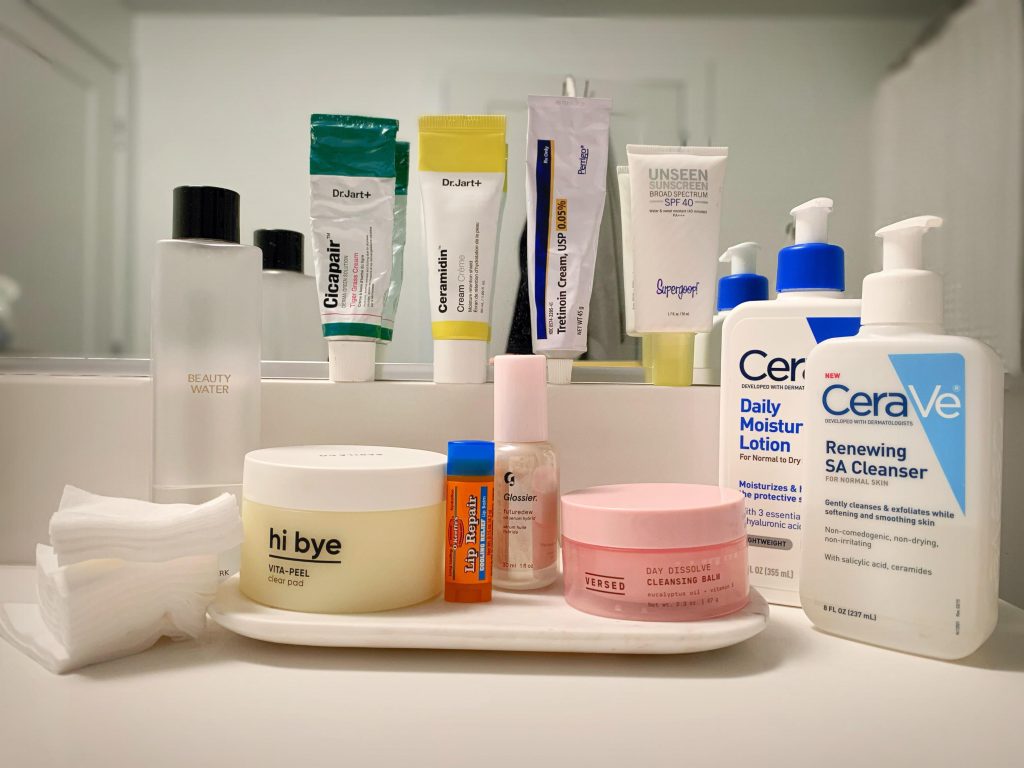
Skincare for acne-prone skin is crucial for achieving clear and healthy skin. Many individuals suffer from acne, impacting their confidence and self-esteem. Acne is a common skin condition characterized by pimples, blackheads, and inflammation. This comprehensive guide will equip you with actionable steps to manage acne effectively and improve your skin’s health and appearance. We’ll delve into understanding acne-prone skin, effective skincare routines, lifestyle choices, and professional guidance. This article will cover different skincare routines, product recommendations, and lifestyle adjustments to address acne and improve your skin’s condition. This guide will also discuss the importance of professional help and provide a clear outline of what you can expect in each section.
Understanding Acne-Prone Skin
What Causes Acne?
Acne arises from a complex interplay of factors, including hormonal fluctuations, genetics, environmental influences, and poor hygiene. Hormonal changes, especially during puberty and menstruation, can trigger an overproduction of sebum. This excess oil, combined with dead skin cells and bacteria, leads to clogged pores, resulting in pimples, blackheads, and inflammation. Genetics play a significant role, as some individuals are predisposed to developing acne.
The Role of Skincare Products
Effective skincare routines for acne-prone skin should focus on addressing the underlying issues contributing to acne formation. This includes removing excess oil, exfoliating dead skin cells, and targeting bacteria to prevent breakouts and maintain skin health. There are various skincare ingredients and products with proven efficacy in treating acne, including salicylic acid, benzoyl peroxide, and retinoids, which are known for their antibacterial, exfoliating, and comedolytic properties.
Effective Skincare Routines for Acne-Prone Skin
Creating a Customized Routine
Developing a tailored skincare routine is crucial for managing acne. This routine should consist of cleansing, toning, moisturizing, and spot treatment steps tailored to your specific skin type and acne concerns. Consider the severity and type of acne and choose products that match your skin’s sensitivity level.
Incorporating Essential Ingredients
The right ingredients can make a noticeable difference in treating acne. Look for products containing ingredients like salicylic acid, benzoyl peroxide, or retinoids, which effectively target clogged pores and inflammation. These ingredients are known for their antibacterial and exfoliating properties that help clear breakouts.
Daily Cleansing is Essential
Maintaining a proper cleansing routine is paramount. Choose a gentle cleanser that effectively removes dirt, oil, and makeup without stripping your skin of its natural oils. Avoid harsh scrubbing, as this can irritate the skin and worsen acne. Cleanse your face twice daily.
Lifestyle Factors and Acne
The Impact of Diet
Diet plays a role in skin health, and acne is no exception. A diet rich in processed foods, sugary drinks, and dairy products can exacerbate acne by increasing inflammation in the body. Consider a diet rich in fruits, vegetables, and lean proteins to support healthy skin. Studies suggest that a balanced diet can contribute to a healthier complexion.
Stress Management Techniques
Stress can contribute to acne breakouts. Stress hormones can influence sebum production, potentially leading to increased oiliness and clogged pores. Practice stress-reducing techniques like meditation, yoga, or spending time in nature to manage stress levels. Find a method that works for you, be consistent, and prioritize your well-being.
Getting Enough Sleep
Adequate sleep is critical for skin repair and regeneration. Lack of sleep can disrupt hormonal balance, which can impact sebum production and trigger acne breakouts. Aim for 7-9 hours of quality sleep every night.
Professional Guidance and Support
Consulting a Dermatologist
When acne becomes persistent or severe, seeking professional help is crucial. A dermatologist can accurately diagnose the type of acne and recommend a personalized treatment plan. They can also assess if the acne is caused by underlying medical conditions, and adjust the treatment accordingly.
Understanding Different Treatment Options
Dermatologists employ various treatment options, including topical medications, oral medications, and specialized procedures. Some treatment options might include prescriptions, while others could be over-the-counter medications. Understanding the pros and cons of each option is vital for selecting the most suitable approach.
Acne Scar Treatment and Prevention
Identifying Different Scar Types
Acne scars can vary greatly in appearance and severity. Understanding the different types of acne scars, such as ice pick scars, rolling scars, or boxcar scars, is crucial for effective treatment. Different scars might require different approaches.
Addressing Scarring Effectively
Treatments for acne scars can include topical creams, laser therapy, or microdermabrasion. The choice of treatment often depends on the type and severity of the scar. Regular skincare practices can be vital in minimizing the risk of scarring.
Frequently Asked Questions
What are the best skincare products for acne-prone skin?
Choosing the right skincare products depends on individual skin type and concerns. Look for products containing salicylic acid or benzoyl peroxide, which help to exfoliate and combat bacteria. Also, consider using gentle cleansers and moisturizers to avoid overdrying the skin. Always consult a dermatologist for personalized recommendations.
How long will it take to see results from skincare for acne-prone skin?
Results vary depending on individual factors like skin type, acne severity, and the chosen treatment plan. Consistent use of effective skincare products, combined with healthy lifestyle choices, generally shows improvement within a few weeks. However, visible results could take several months, or longer. Be patient and consistent in your approach to see lasting improvements.
In conclusion, achieving clear skin for acne-prone individuals requires a multifaceted approach encompassing skincare routines, dietary choices, stress management, and seeking professional advice when necessary. By diligently following the steps outlined in this guide and understanding the science behind acne, you can significantly improve your skin’s health and appearance. Ready to take control of your skin? Consult a dermatologist or visit our website for personalized recommendations and support.